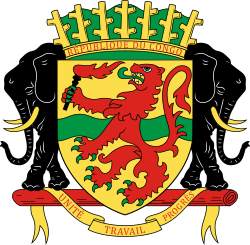 |
|---|
Territorial Assembly elections were held in Moyen-Congo in 1952. The Congolese Progressive Party emerged as the largest faction, winning 16 seats in the second college. [1]
 |
|---|
Territorial Assembly elections were held in Moyen-Congo in 1952. The Congolese Progressive Party emerged as the largest faction, winning 16 seats in the second college. [1]
The 37 members of the Territorial Assembly were elected in two colleges; the first college elected 13 members and the second elected 24. [2]
| Party | Seats | |
|---|---|---|
| First College | ||
| Rally of the French People | 13 | |
| Second College | ||
| Congolese Progressive Party | 16 | |
| French Section of the Workers' International | 8 | |
| Total | 37 | |
| Source: Gauze [1] | ||